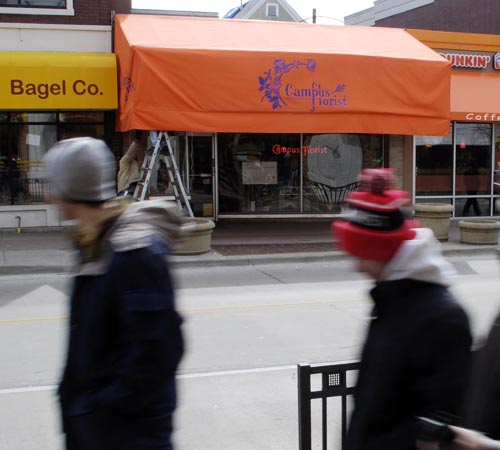Big business pinches small shops

Brennan Caughron The Daiy Illini Students walking down green street pass on the opposite side of Howboda Bagel Co. and Dunkin’ Doughnuts on Tuesday March 3, 2009.
Mar 4, 2009
As corporate businesses invade Green Street, smaller businesses may start to feel some pressure.
When Panera Bread opens in the spring, three places that sell bagels will be within just a few feet of each other.
Ryan McNeily, University alum and co-owner of Howbowda Bagel, 611A E. Green St., said that corporate chains will “put the crunch on us a little bit” and may affect business.
“The fact that both Panera and Dunkin’ Donuts are so close is definitely going to have an effect,” McNeily said. “The big brand names are more of a comfortable place for some people because almost everyone has a Panera or a Dunkin’ Donuts in their hometown, or they have been to one of them.”
Howbowda Bagel opened in August 2008, and just four months later, Dunkin’ Donuts, 607 E. Green St., opened one store down.
Get The Daily Illini in your inbox!
This spring, Panera Bread is scheduled to open across the street from Howbowda Bagel and Dunkin’ Donuts.
“Panera Bread seeks opportunities where we can bring our bakery-cafe concept to neighborhoods that would appreciate what we offer,” said Linn Parrish, vice president of public relations for Panera Bread Company. “Typically, we look for a mix of residential and business customers who would enjoy Panera throughout the day.”
Panera does not necessarily look at what local stores are already operating in the area, she said.
Corporations will crowd out some of the small, weaker businesses, said Frances McGuckin, small business expert and author of “Business for Beginners” and “Taking Your Business to the Next Level.”
“The weaker businesses are usually those without a formal business plan that they do not revisit regularly and adjust when the economy changes,” McGuckin said. “I believe that the strong small business will and does survive. It has been proven that in a recession-type economy that it is the smaller businesses that keep the local economies in business.”
Supporting a local business over a corporate business will not have a significant effect on the economy, said Fred Giertz, University economics professor and interim department head.
“The chain store employees are still local people, so their money is being spent in the local area,” Giertz said. “The only impact of supporting one over the other is that it will change how well each store does.”
Small businesses can use strategies that larger corporations can not use as effectively to prevent being crowded out, McGuckin said.
“They could adjust their operating hours or staff or implement extra service ideas to attract people,” she said. “A larger chain cannot make or implement these ideas with such speed.”
Despite the new chain stores opening up right next door, McNeily said the customer base has remained strong.
“The new and incoming students will probably go to one of those places before us just because they don’t know about what we serve,” McNeily said. “But we have gotten a pretty strong response. We get customers in here all the time who say that they really like the unique bagels and sandwiches we serve.”





